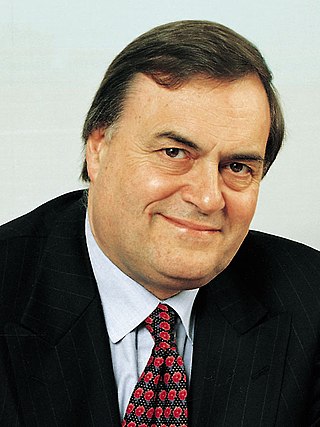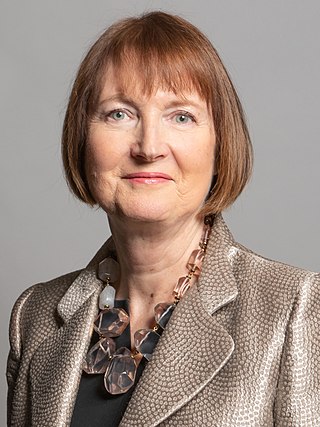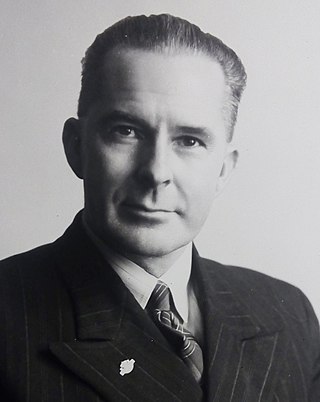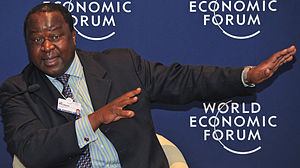
The deputy prime minister of the United Kingdom is an honorific title given to a minister of the Crown and a member of the British Cabinet, normally to signify a very senior minister, the deputy leader of the governing party, or a key political ally of the prime minister. It does not entail any specific legal responsibilities, though the holder may be assigned some, and is usually paired with a departmental secretary of state position. The title is not always in use and prime ministers have been known to appoint deputies with title first secretary of state or informal deputies without any honorific title. The current deputy prime minister is Angela Rayner.

John Leslie Prescott, Baron Prescott was a British politician who served as Deputy Prime Minister of the United Kingdom from 1997 to 2007 and as First Secretary of State from 2001 to 2007. A member of the Labour Party, he was Member of Parliament (MP) for Kingston upon Hull East for 40 years, from 1970 to 2010. He was often seen as the political link to the working class in a Labour Party increasingly led by modernising, middle-class professionals such as Tony Blair and Peter Mandelson, and developed a reputation as a key conciliator in the often fractious relationship between Blair and Gordon Brown.

The deputy prime minister of New Zealand is the second-most senior member of the Cabinet of New Zealand. The officeholder usually deputises for the prime minister at official functions. The current deputy prime minister is Winston Peters of the NZ First party, who has held the position twice before, and will serve until 31 May 2025 due to an arrangement under the current coalition government in which he would then be succeeded in the position by ACT party leader David Seymour.

Harriet Ruth Harman, Baroness Harman,, is a British politician and solicitor. She was a Member of Parliament (MP) for more than 40 years, from 1982 to 2024, making her the second longest-serving female MP in British history after Baroness Beckett. Harman was MP for Camberwell and Peckham from 1997 to 2024 and MP for Peckham from 1982 to 1997. A member of the Labour Party, she was Deputy Labour Leader and Chair of the Labour Party from 2007 to 2015, and also briefly served as Leader of the Opposition in 2010 and 2015, after the resignations of Gordon Brown and Ed Miliband, respectively. She served in various Cabinet and Shadow Cabinet positions. She has been a member of the House of Lords since 2024. The same year, Harman succeeded Labour Party MP Jess Phillips as co-host of the Sky News podcast Electoral Dysfunction, alongside political editor Beth Rigby and former Scottish Conservatives Leader Baroness Davidson of Lundin Links.

Sir Michael John Cullen was a New Zealand politician. He was a Member of the New Zealand House of Representatives from 1981 to 2009, the Deputy Leader of the New Zealand Labour Party from 1996 to 2008 and a senior minister in the Fifth Labour Government from 1999 to 2008, serving as Deputy Prime Minister, Minister of Finance, and Attorney-General.

Dame Annette Faye King is a former New Zealand politician. She served as Deputy Leader of the New Zealand Labour Party and Deputy Leader of the Opposition from 2008 to 2011, and from 2014 until 1 March 2017. She was a Cabinet Minister in the Fourth and Fifth Labour Governments, and was the MP for the Rongotai electorate in Wellington from 1996 to 2017.

The Order of the Red Banner of Labour was an order of the Soviet Union established to honour great deeds and services to the Soviet state and society in the fields of production, science, culture, literature, the arts, education, sports, health, social and other spheres of labour activities. It is the labour counterpart of the military Order of the Red Banner. A few institutions and factories, being the pride of Soviet Union, also received the order. The Order of the Red Banner of Labour was the third-highest civil award in the Soviet Union, after the Order of Lenin and the Order of the October Revolution.
The 1994 Labour Party leadership election was held on 21 July 1994 following the death of the incumbent leader, John Smith, on 12 May. Tony Blair won the leadership and became Prime Minister after winning the 1997 general election.

The Deputy Leader of the Labour Party is the second highest ranking politician in the British Labour Party. The Deputy Leader also serves as the Deputy Chairperson of the Labour Party, and acts as Leader in the House in events where the leader cannot.
The 2007 Labour Party deputy leadership election was a British political party election for the position of deputy leader of the Labour Party. John Prescott, the previous deputy leader, announced on 10 May 2007 that he was standing down from that position and that he would be leaving as deputy prime minister about the same time that Tony Blair tendered his resignation as prime minister.

Clarence Farrington Skinner, commonly known as Jerry or Gerry Skinner, was a Labour politician from New Zealand, the third deputy prime minister of New Zealand between 1957 and 1960, and a minister from 1943 to 1949 and 1957 to 1960 in the First and Second Labour governments.

Grant Murray Robertson is a retired New Zealand politician and member of the Labour Party who served as the Minister of Finance from 2017 to 2023, as Minister of Foreign Affairs in November 2023, and as the 19th Deputy Prime Minister of New Zealand from 2020 to 2023. He was the member of Parliament (MP) for Wellington Central from 2008 to 2023.

The leader of the Labour Party is the highest position within the United Kingdom's Labour Party. The current holder of the position is Prime Minister of the United Kingdom, Keir Starmer, who was elected to the position on 4 April 2020, following his victory in the party's leadership election.

Carmel Jean Sepuloni is a New Zealand politician who served as the 20th deputy prime minister of New Zealand. A member of the Labour Party, she was first elected to Parliament in 2008 for a three-year term as a list Member of Parliament (MP) and was re-elected as MP for Kelston in 2014. In 2023, she was elected as the deputy leader of the Labour Party, succeeding Kelvin Davis.

Ministry of Labour and Social Affairs of Iran, was the main organ of Iranian Government in charge of the regulation and implementation of policies applicable to labour and social affairs.

The Ministry of Labour and Social Economy (MITES) is the department of the Government of Spain responsible for planning and carrying out the government policy on labour relations and social economy.

Angela Rayner is a British politician who has served as Deputy Prime Minister of the United Kingdom and Secretary of State for Housing, Communities and Local Government since July 2024. She has been Deputy Leader of the Labour Party since 2020 and Labour and Co-operative Member of Parliament (MP) for Ashton-under-Lyne since 2015. Ideologically she identifies as a socialist and as being part of Labour's soft left.

The 1974 New Zealand Labour Party leadership election was held on 6 September 1974 to determine the eighth leader of the New Zealand Labour Party. The election was won by Tasman MP Bill Rowling.

The 1989 New Zealand Labour Party leadership election was held to determine the leadership of the New Zealand Labour Party. The leadership was won by Christchurch Central MP and incumbent deputy leader Geoffrey Palmer.

Michael Bagraim is a South African politician and labour lawyer. A member of the Democratic Alliance, he was elected to the National Assembly in 2014. He was then appointed Shadow Deputy Minister of Labour. In 2017, Bagraim was promoted to Shadow Minister of Labour. After the 2019 election, he was made Shadow Deputy Minister of Labour and Employment.

































